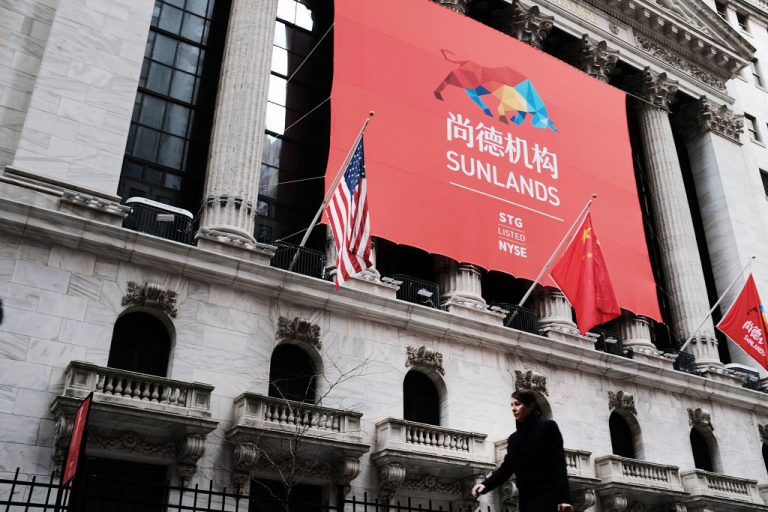The Chinese Communist Party has been hard at work attempting to subvert weak links at America’s central bank, the Federal Reserve, since at least 2013, a newly released Senate report shows.
Issued on July 26 by the Republican minority side of the Senate Homeland Security and Governmental Affairs Committee (HSGAC), the report, titled China’s Threat to the Fed: Chinese Influence and Information Theft at U.S. Federal Reserve Banks, stated the reigning Chinese government has been comprehensive in its attempts to gather intelligence and influence the lynchpin of the financial world.
In a Press Release, Ranking Member Sen. Rob Portman (R-OH) stated that the CCP “is using every tool at its disposal to infiltrate and steal valuable information.”
MORE ON CHINESE COMMUNIST CONFLICTS OF INTEREST
- Kate Brown Attended Meeting With United Front Association, Signed Deal With Beijing in 2015
- UK, Canadian Intelligence Agencies Raise the Alarm Over Chinese Espionage Activity
- Beijing Used US Firm to Coerce Big Media, Universities, Think Tanks to Serve Communist ‘United Front’
“I am concerned by the threat to the Fed and hope our investigation, which is based on the Fed’s own documents and corresponds with assessments and recommendations made by the FBI, wakes the Fed up to the broad threat from China to our monetary policy,” Portman added.
The ‘P-Network’
The 48-page report cited “Federal Reserve counteringelligence analysis” as identifying 13 individuals as “having connections with known Chinese talent recruitment plan members among 8 of the 12 Federal Reserve banks.”
Success
You are now signed up for our newsletter
Success
Check your email to complete sign up
The group was dubbed the “P-Network.”
In some examples given, one potentially compromised P-Network individual was detained by CCP enforcers in their hotel no less than four times during a trip to Shanghai in 2019.
The report states that the Party’s enforcers threatened the individual’s family unless they agreed to provide “economic information and assistance.”
The individual in question apparently maintained a WeChat account on their cellphone, a well known surveillance and social management tool masquerading as a chat app employed by the communist regime both inside and outside of China.
During the interaction, the person’s phone and computers were tapped, and all contact information from the devices were downloaded via WeChat.
The individual was also pressured to sign a document agreeing not to “discuss the interactions.”
‘Close ties’ to China’s central bank
Additionally, the report found “multiple U.S. Federal Reserve employees” who held a spurious conflict of interest as they maintained “close ties” to the People’s Bank of China (PBoC), the Chinese central bank.
One such individual held a position at PBoC in 2017, and yet was hired by the Fed nonetheless.
Moreover, “Multiple Federal Reserve employees” were found to “maintain close ties” to a wide array of “academic organizations” associated with the CCP’s notorious Thousand Talents Program, a state-sanctioned Party endeavor to win over and recruit people of skill and prominence in the international community to operate as its servants.
Another P-Network Fed employee who had “connections with Chinese talent recruitment programs and extensive and unusual travel patterns in China” was found to be cozy with Xinhua, the CCP’s propaganda outlet, to such an extent that they invited “officials” to both Washington and the city where their Fed branch is seated.
Although the list of obvious covert transgressions is both damning and verbose, another case that raises significant question marks is that of an individual with access to no less than the Federal Reserve Board’s data, who actually gave a modeling code for the data to a CCP university tied to the PBoC.
According to a July 26 report by Politico, Federal Reserve Chairman Jerome Powell dismissed the report’s allegations.
In a letter to Portman, Powell stated that the Fed takes its information security policy seriously and would, in principle, be concerned about “any supportable allegation of wrongdoing.”
However, the Chairman followed up his reasoning by stating, “In contrast, we are deeply troubled by what we believe to be the report’s unfair, unsubstantiated and unverified insinuations about particular, individual staff members.”
The HSGAC report notably claims that the Fed, “Did not take any steps to update its policies to account for threats from China until after the Committee initiated its inquiry.”
The CCP’s efficacy and success with compromising high level individuals in U.S. society is far from breaking news.
In July of 2021, news broke that multiple U.S. Federal Court judges, and even Supreme Court Justice Samuel Alito, had served as visiting professors at China’s Peking University.
The University is notorious for being a CCP United Front operation, a subversion campaign headed by a former leader of a Party intelligence agency.
A 2019 report issued by the Australian Strategic Policy Institute think tank stated that, “Overseas organisations, often linked to the CCP’s united front system and overlapping with its political influence efforts” are often “paid to run most of the [Thousand Talents] stations.”
In another instance from April of 2021, NIH Deputy Director for Extramural Research, Dr. Michael Lauer told a Senate Committee that as many as 500 “scientists of concern” were under investigation for spending as much as “50 to 60 percent” of their time in mainland China.
Nonetheless, in March, the Biden Administration’s Department of Justice decided to end the “China Initiative,” started in 2018 under President Trump for the purposes of rooting out and eliminating the CCP’s economic espionage and technology transfer initiatives.
National Security Division Chief Matthew Olsen claimed that the China Initiative “fueled a narrative of intolerance and bias” and was having a negative effect on U.S. scientific collaboration and recruitment.
Chairman Powell is set to announce another round of hikes to the Fed’s key interest rate on July 26.
In June, the bank hiked 75 basis points, its largest hike in almost 30 years, bringing the rate to 1.5 percent after slashing rates to nearly zero after COVID-19 pandemic hysteria rocked the worldwide economy.
















